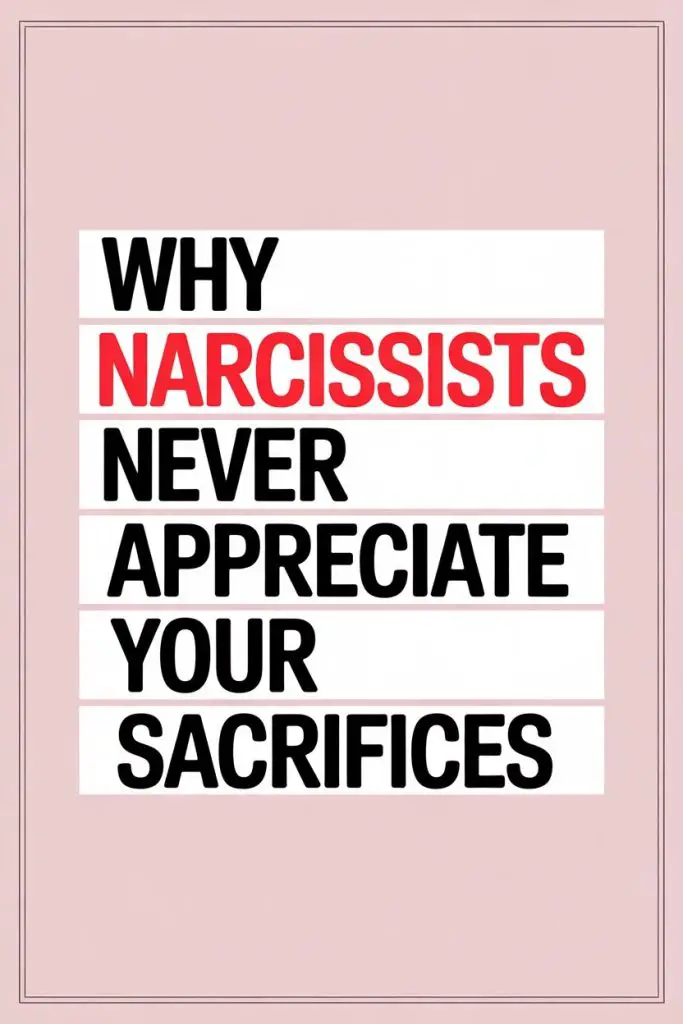If you’ve ever bent over backwards for a narcissist and still felt like you were doing cartwheels in an empty arena, you’re far from alone.
People with narcissistic tendencies have a knack for making even the grandest of gestures seem invisible, or—brace yourself—expected.
Let’s unpack why that is, how it happens, and what you can do to keep your sanity (and self-worth) intact.
The Mind of the Narcissist and the Missing Empathy Chip
Empathy isn’t just a warm, fuzzy feeling; it’s the glue that holds relationships together. Narcissists, though, seem to come equipped with a glue stick that ran out in 1997.
They can mimic concern or gratitude when it suits their interests, but genuine appreciation? That’s rarer than a polite driver during rush hour.
A narcissist’s worldview is tightly wound around their own needs, wants, and feelings.
Other people’s sacrifices register only as background noise—or worse, as proof that they’re as special as they believe. But don’t expect them to thank you for it.
Why Your Efforts Feel Like They Vanish into a Black Hole
You clean up their messes. You give up time, money, comfort, maybe even friendships just to keep the peace. After all that, you’re met with a shrug or, on a good day, a bland “thanks.”
Here’s the kicker: Narcissists view sacrifice through a lens that distorts generosity into obligation. Your time and energy aren’t gifts to them—they’re merely what you owe for being in their inner circle.
If you’re waiting for a parade in your honor, put away the confetti. You could hand them the moon, and they’d ask why it isn’t full.
The Never-Ending Goldilocks Game
Ever feel like no matter what you give, it’s too little, too late, or somehow not exactly right? Welcome to the Goldilocks Game—narcissist edition.
Your sacrifices are always “not quite enough.” If you miss one tiny detail, the focus zips straight to what you didn’t do, rather than what you did.
And if you dare mention your efforts? Suddenly you’re accused of keeping score or being selfish. It’s a neat little trick: You get to give, and they get to move the finish line.
When Sacrifice Becomes Fuel for Entitlement
There’s a certain breed of entitlement that grows wild in the narcissist’s garden. Every time you make a sacrifice, it waters their sense that they deserve more.
Instead of feeling grateful, they simply expect you to keep it coming.
Soon, your selflessness becomes the new baseline. No matter how steep the price you pay, they’ll act like you handed over Monopoly money.
The Art of Selective Amnesia
Even if your sacrifices are so grand they deserve their own Wikipedia page, narcissists can develop a curious kind of forgetfulness.
Past favors? Never happened. That time you dropped everything to help? A distant rumor.
This is more than simple forgetfulness—it’s a self-preservation tactic. If they acknowledged your sacrifices, it would mean admitting they needed help or, heaven forbid, that you did something praiseworthy. Can’t have that, can we?
Why Guilt and Obligation Are Their Favorite Tools
Narcissists have a sixth sense for sniffing out guilt and obligation in others. If you make a sacrifice, they might act wounded or disappointed rather than appreciative, making you feel you haven’t done enough.
This keeps you chasing their approval, hoping that maybe next time you’ll hit the invisible jackpot.
It’s a game with no finish line and no real winners. Except maybe their ego, which gets fat while your self-esteem goes hungry.
The Illusion of Reciprocity
Relationships run on give-and-take. With a narcissist, it’s more like give, give, and give some more. Sacrifice isn’t matched or reciprocated—it’s expected, and often dismissed as “just what you should do.”
Try to ask for the same in return, and you’ll get more excuses than a student during exam season. Or worse: You’ll be accused of being needy or, my personal favorite, “negative.”
When Sacrifice Is Twisted against You
Brace yourself for this magic trick. Sometimes, narcissists will use your sacrifices as ammunition. That promotion you turned down for them? Suddenly, you’re accused of holding them back.
Gave up your Saturday to help with their project? You’re “controlling” or “making them feel guilty.”
The script is always changing, but one thing stays the same: Your selflessness becomes the villain, never the hero.
The Halo Effect—and Why You Never Get One
Acts of sacrifice are supposed to generate goodwill, love, or at least a nice dinner out. When you’re dealing with a narcissist, your halo keeps getting handed to them instead.
They’ll retell your good deeds as proof of their own charm or importance, not yours.
Your sacrifice doesn’t make you an angel in their eyes—it just reflects their own supposed greatness.
Breaking Free from the Sacrifice Spiral
The urge to please or fix things for a narcissist can become a habit—a tough one to break. Here’s the truth: No matter how much you contort yourself, genuine appreciation isn’t coming.
What can you do? Hit pause. Start asking yourself: “Am I doing this because I want to, or because I think I have to?”
Practice saying no. Set limits, even if they’re met with fireworks-level drama.
Focus on self-care and reconnect with friends or family who value you for you—not for what you can do for them. If you need help, don’t wait for permission.
A good therapist or support group can remind you what real appreciation feels like.
When Enough Is Enough
Stepping off the hamster wheel of sacrifice is tough—especially when you care. But life’s too short to keep auditioning for applause that’s never coming.
Your efforts are real. Your sacrifices matter. Even if the narcissist never sees it, plenty of other people do.
So go ahead and save your energy for those who truly appreciate it.
You deserve nothing less.


